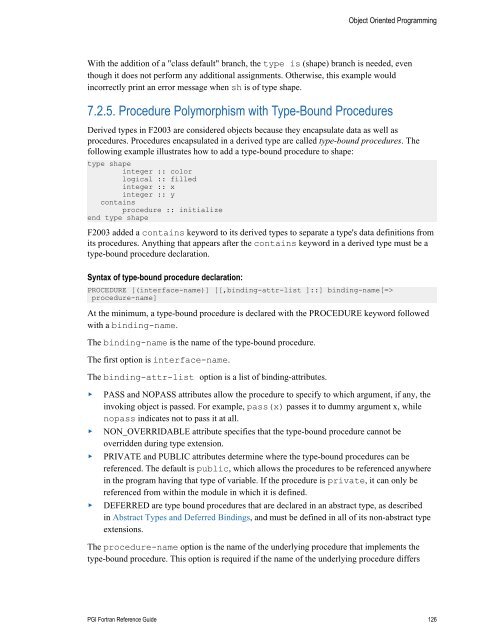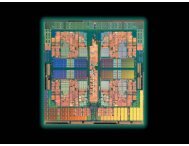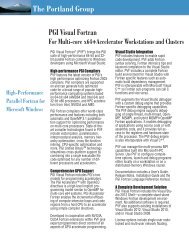- Page 1 and 2:
PGI Fortran Reference GuideVersion
- Page 3 and 4:
Chapter 2. Fortran Data Types......
- Page 7 and 8:
5.5. Formatted Data Transfer.......
- Page 9 and 10:
Return Value.......................
- Page 12 and 13:
7.4.2. Allocatable Polymorphic Vari
- Page 14 and 15:
8.7.14. SINGLE ... END SINGLE......
- Page 16 and 17:
Description........................
- Page 18 and 19:
9.1.48. putenv.....................
- Page 20 and 21:
Example............................
- Page 22 and 23:
LIST OF TABLESTable 1 Fortran Chara
- Page 24 and 25:
PREFACEThis manual describes the Po
- Page 26 and 27:
PrefaceInteroperability with C, des
- Page 28 and 29:
PrefacePGI Fortran Reference Guide
- Page 30 and 31:
Language Overview‣ Fixed source f
- Page 32 and 33:
Language OverviewCharacterDescripti
- Page 34 and 35:
Language Overview1.4.5. Fixed Forma
- Page 36 and 37:
Language OverviewThe last example i
- Page 38 and 39:
Language OverviewTable 5 Arithmetic
- Page 40 and 41:
Language OverviewOperator.EQV.Relat
- Page 42 and 43:
Language Overview1.9.3. Character A
- Page 44 and 45:
Chapter 2.FORTRAN DATA TYPESEvery F
- Page 46 and 47:
Fortran Data TypesType Meaning Size
- Page 48 and 49:
Fortran Data Typessome of these con
- Page 50 and 51:
Fortran Data Typesdouble quotes or
- Page 52 and 53:
Fortran Data Typestype. These types
- Page 54 and 55:
Fortran Data Types2.6.1. Array Decl
- Page 56 and 57:
Fortran Data Types2.8. Fortran Bina
- Page 58 and 59:
Fortran Data Types‣ The byte size
- Page 60 and 61:
Fortran Data TypesThe following exa
- Page 62 and 63:
Fortran Data TypesThe following exa
- Page 64 and 65:
Fortran Data Types2.11.2. Pointer A
- Page 66 and 67:
Fortran StatementsF77FORTRAN 77 sta
- Page 68 and 69:
Fortran StatementsStatement Origin
- Page 70 and 71:
Fortran StatementsStatement Origin
- Page 72 and 73:
Fortran Statements3.4. ARRAYThe ARR
- Page 74 and 75:
Fortran Statementscis an integer ex
- Page 76 and 77:
Fortran StatementsF90SyntaxThe synt
- Page 78 and 79:
Fortran StatementsSyntaxEND MAPDesc
- Page 80 and 81:
Fortran Statements3.14. MAPA union
- Page 82 and 83:
Fortran Statementslike a normal var
- Page 84 and 85:
Fortran Statementsrecord_namelistis
- Page 86 and 87:
Fortran StatementsExampleSUBROUTINE
- Page 88 and 89:
Fortran Statementsterminated by MAP
- Page 90 and 91:
Fortran StatementsDescriptionBeing
- Page 92 and 93:
Chapter 4.FORTRAN ARRAYSFortran arr
- Page 94 and 95:
Fortran ArraysAn array has a maximu
- Page 96 and 97:
Fortran Arrays4.4. Array Constructo
- Page 98 and 99:
Input and OutputFiles may contain o
- Page 100 and 101:
Input and OutputSpecifierDECIMAL= s
- Page 102 and 103:
Input and Outputvalue may correspon
- Page 104 and 105: Input and OutputOn output, if l is
- Page 106 and 107: Input and Output5.5.2.7. ES Format
- Page 108 and 109: Input and OutputThe basic form of t
- Page 110 and 111: Input and OutputThe TL form specifi
- Page 112 and 113: Input and Output5.7. List-directed
- Page 114 and 115: Input and Output‣ Complex constan
- Page 116 and 117: Input and OutputAll edit descriptor
- Page 118 and 119: Fortran Intrinsics6.1.1. Fortran 90
- Page 120 and 121: Fortran Intrinsics6.1.3. Fortran 90
- Page 122 and 123: Fortran IntrinsicsGenericNamePurpos
- Page 124 and 125: Fortran IntrinsicsGeneric NamePurpo
- Page 126 and 127: Fortran IntrinsicsGenericNameININTP
- Page 128 and 129: Fortran IntrinsicsGeneric NameGET_C
- Page 130 and 131: Fortran Intrinsics6.5. ASSOCIATEDDe
- Page 132 and 133: Fortran Intrinsics6.9. CONJGReturn
- Page 134 and 135: Fortran IntrinsicsArgumentsThe argu
- Page 136 and 137: Fortran Intrinsics6.18. LEADZCounts
- Page 138 and 139: Fortran IntrinsicsReturn ValueA val
- Page 140 and 141: Fortran IntrinsicsSynopsisZEXT(A)Ar
- Page 142 and 143: Fortran IntrinsicsTable 22 IEEE_ARI
- Page 144 and 145: Fortran Intrinsics6.27.5. IEEE_ARIT
- Page 146 and 147: Fortran Intrinsics‣ halting is of
- Page 148 and 149: Fortran Intrinsics6.30. Module iso_
- Page 150 and 151: Object Oriented ProgrammingInherita
- Page 152 and 153: Object Oriented Programming7.2.2. T
- Page 156 and 157: Object Oriented ProgrammingType-Bou
- Page 158 and 159: Object Oriented ProgrammingUsing th
- Page 160 and 161: Object Oriented ProgrammingA type-b
- Page 162 and 163: Object Oriented ProgrammingCode Usi
- Page 164 and 165: Object Oriented ProgrammingHere is
- Page 166 and 167: Object Oriented ProgrammingThe type
- Page 168 and 169: Object Oriented ProgrammingThe foll
- Page 170 and 171: Object Oriented ProgrammingRecall t
- Page 172 and 173: Object Oriented ProgrammingThe addV
- Page 174 and 175: Object Oriented ProgrammingThe foll
- Page 176 and 177: Object Oriented Programmingprogram
- Page 178 and 179: Chapter 8.OPENMP DIRECTIVES FOR FOR
- Page 180 and 181: OpenMP Directives for Fortran‣ An
- Page 182 and 183: OpenMP Directives for Fortran8.3.2.
- Page 184 and 185: OpenMP Directives for Fortran8.4. P
- Page 186 and 187: OpenMP Directives for FortranClause
- Page 188 and 189: OpenMP Directives for Fortran‣ Yo
- Page 190 and 191: OpenMP Directives for Fortran‣ Va
- Page 192 and 193: OpenMP Directives for FortranDirect
- Page 194 and 195: OpenMP Directives for FortranThe CR
- Page 196 and 197: OpenMP Directives for FortranREDUCT
- Page 198 and 199: OpenMP Directives for FortranUsageA
- Page 200 and 201: OpenMP Directives for Fortran‣ Th
- Page 202 and 203: OpenMP Directives for FortranLASTPR
- Page 204 and 205:
OpenMP Directives for FortranClause
- Page 206 and 207:
OpenMP Directives for Fortran‣ Un
- Page 208 and 209:
OpenMP Directives for Fortrangoal o
- Page 210 and 211:
OpenMP Directives for FortranRuntim
- Page 212 and 213:
OpenMP Directives for Fortran8.9. O
- Page 214 and 215:
OpenMP Directives for FortranThe AP
- Page 216 and 217:
Chapter 9.3F FUNCTIONS AND VAX SUBR
- Page 218 and 219:
3F Functions and VAX SubroutinesDes
- Page 220 and 221:
3F Functions and VAX SubroutinesDes
- Page 222 and 223:
3F Functions and VAX SubroutinesDes
- Page 224 and 225:
3F Functions and VAX SubroutinesDes
- Page 226 and 227:
3F Functions and VAX SubroutinesSyn
- Page 228 and 229:
3F Functions and VAX Subroutines9.1
- Page 230 and 231:
3F Functions and VAX SubroutinesSyn
- Page 232 and 233:
3F Functions and VAX SubroutinesSyn
- Page 234 and 235:
3F Functions and VAX Subroutines9.1
- Page 236 and 237:
3F Functions and VAX SubroutinesSyn
- Page 238 and 239:
3F Functions and VAX SubroutinesSyn
- Page 240 and 241:
3F Functions and VAX SubroutinesDes
- Page 242 and 243:
3F Functions and VAX Subroutinestha
- Page 244 and 245:
Chapter 10.INTEROPERABILITY WITH CF
- Page 246 and 247:
Interoperability with C10.2.2. c_f_
- Page 248 and 249:
Interoperability with CExampleprogr
















